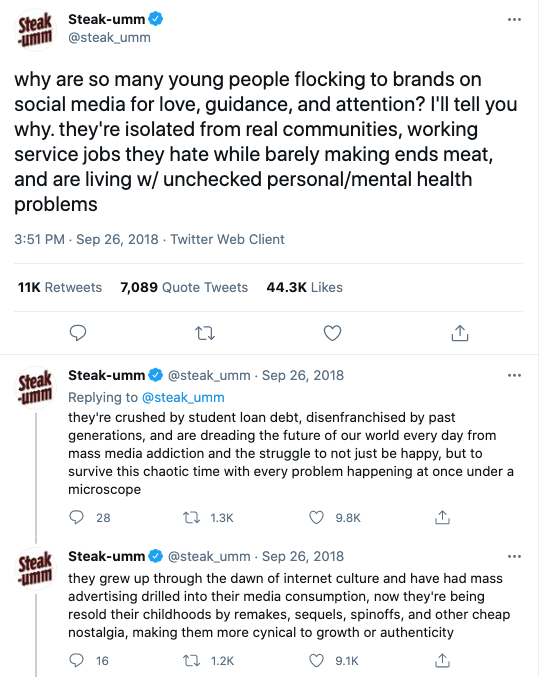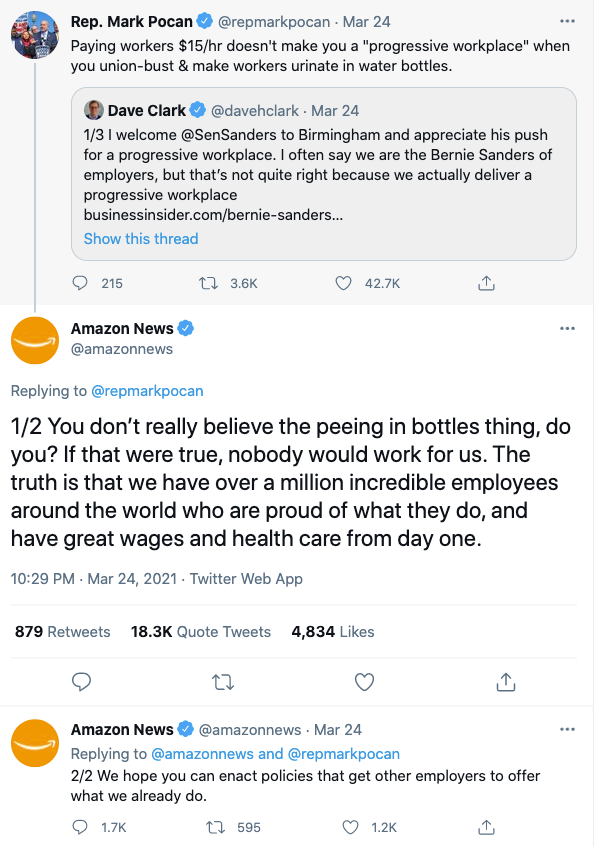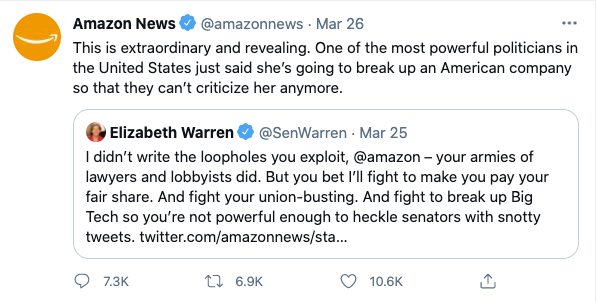Should brands like Amazon attack their enemies on social media?
It’s a truism in social media circles: brands should be more human. Of course, humans have a full range of emotions — they can be angry, not just nice or funny. Do we really want angry brands? Brands like Amazon that attack people on social media are going to find out they’re making a mistake.
Brand accounts are better with personality
In the last few years, brands have started fencing with their social media accounts. And in general, it’s all in good fun.
Steak-umm, a brand of shredded, frozen beef, likes to philosophize.

And Wendy’s has been known to get into twit-for-tat battles with other fast-food franchises.

This is light-hearted stuff. It humanizes and attracts attention to brands.
But Amazon’s Twitter has taken to attacking its enemies
Amazon is massive and growing. That growth comes along with problems. Amazon employees in Alabama are voting on whether to unionize. There are reports that both factory workers and Amazon drivers — who are controlled by the company, even though they are not employees — don’t have time for bathroom breaks and are peeing in bottles. Members of Congress are talking about breaking up the company. It’s not an exaggeration to say that Amazon is constantly under attack.
Any company in this situation would mobilize its resources. It would fight cases in court, make comments in media, issue press releases citing its version of facts and statistics, and deploy lots of lobbyists.
Historically, the role of social media in these fights has been to post links to sober videos and press releases from leaders, along with screen shots of the text of statements. But Amazon has gone further. It is attacking its critics directly — sort of the way Wendy’s does, but with malice in place of humor.
Dave Clark, CEO of worldwide consumer, posted this sarcastic set of tweets regarding Bernie Sanders’ visit to the workers considering unionizing:

Then the aggressive responses migrated to Amazon’s official news account. Here’s how it responded to Wisconsin representative Mark Pocan.

And here’s how it countered calls to break it up from Massachusetts Senator Elizabeth Warren.

Amazon isn’t helping itself with these attacks
I would expect Amazon to bring every possible resource to bear in its fight to protect itself. And that, of course, includes Twitter.
According to Recode, the directive for a more aggressive response — including, presumably, for the Twitter account to go on the offensive — came from Jeff Bezos himself.
If the tone in these tweets sounds familiar, it’s because we’ve seen these kind of attacks a lot before — in President Trump’s now shuttered account.
Amazon has a long way to go before it becomes as abusive and nasty as Trump was. You could argue that it is just defending itself.
But even when public officials criticize the company, I don’t think the right response is to attack and ridicule those officials on Twitter.
First, it confirms an adversarial relationship between Congress and Amazon, which is not going to accomplish anything for Amazon.
Second, it positions Amazon as aggressive and mean-spirited, which is unlikely to contribute to its goals of blocking the union or improving its public image.
Here’s where I’d draw the line.
Aggressive Twitter responses from companies should present facts, not speak directly to accusers. Brands need to show who they are and what they stand for, not get into tweet fights with public officials.
I hope Amazon loses these battles. Because if it doesn’t, more companies will become combative on their social media accounts, following Amazon’s lead.
Politics on social media has become a lot less nasty since @realdonaldtrump disappeared. I’m in no rush to see a resurgence of that tone in corporate PR.
Judging from the ratios on some of those tweets you quoted, the internet agrees with you, Josh. (As do I.)
Should companies respond to social media comments from known folks? anyone?
Should known folks comment on companies?
Is there an effective way to make whiners like Warren and Sanders (and Trump) just shut TFU?
I think all do it in the interest of fueling or starting the fire.
If one thinks companies can/should respond, how would one improve the response about peeing-in-the-bottle comment? BTW, never ever touch a “Gatorade(R)” bottle along the highway. That is pee or worst, for sure.
I would argue that companies and known folks OUGHT to respond to real complaints and rumors, but ought to ignore the noise and ought NOT fuel/start fires. Amazon and Warren and others just look like fools. Wait, maybe that is revealing and ought to be encouraged…